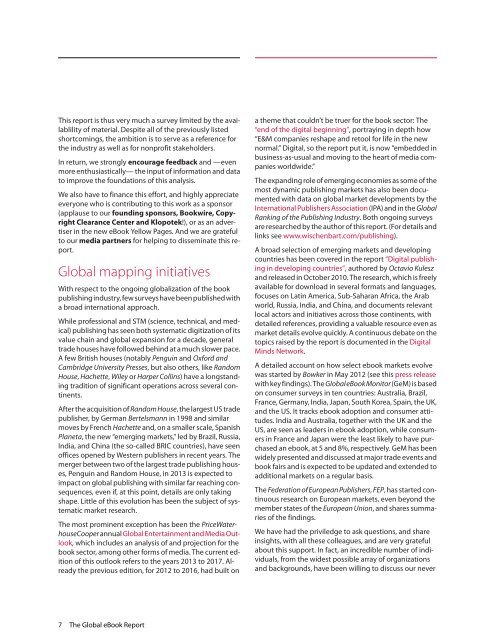1234000000358_04042014_final
1234000000358_04042014_final
1234000000358_04042014_final
You also want an ePaper? Increase the reach of your titles
YUMPU automatically turns print PDFs into web optimized ePapers that Google loves.
This report is thus very much a survey limited by the availablilityof material. Despite all of the previously listedshortcomings, the ambition is to serve as a reference forthe industry as well as for nonprofit stakeholders.In return, we strongly encourage feedback and —evenmore enthusiastically— the input of information and datato improve the foundations of this analysis.We also have to finance this effort, and highly appreciateeveryone who is contributing to this work as a sponsor(applause to our founding sponsors, Bookwire, CopyrightClearance Center and Klopotek!), or as an advertiserin the new eBook Yellow Pages. And we are gratefulto our media partners for helping to disseminate this report.Global mapping initiativesWith respect to the ongoing globalization of the bookpublishing industry, few surveys have been published witha broad international approach.While professional and STM (science, technical, and medical)publishing has seen both systematic digitization of itsvalue chain and global expansion for a decade, generaltrade houses have followed behind at a much slower pace.A few British houses (notably Penguin and Oxford andCambridge University Presses, but also others, like RandomHouse, Hachette, Wiley or Harper Collins) have a longstandingtradition of significant operations across several continents.After the acquisition of Random House, the largest US tradepublisher, by German Bertelsmann in 1998 and similarmoves by French Hachette and, on a smaller scale, SpanishPlaneta, the new “emerging markets,” led by Brazil, Russia,India, and China (the so-called BRIC countries), have seenoffices opened by Western publishers in recent years. Themerger between two of the largest trade publishing houses,Penguin and Random House, in 2013 is expected toimpact on global publishing with similar far reaching consequences,even if, at this point, details are only takingshape. Little of this evolution has been the subject of systematicmarket research.The most prominent exception has been the PriceWaterhouseCooperannual Global Entertainment and Media Outlook,which includes an analysis of and projection for thebook sector, among other forms of media. The current editionof this outlook refers to the years 2013 to 2017. Alreadythe previous edition, for 2012 to 2016, had built ona theme that couldn’t be truer for the book sector: The“end of the digital beginning”, portraying in depth how“E&M companies reshape and retool for life in the newnormal.” Digital, so the report put it, is now “embedded inbusiness-as-usual and moving to the heart of media companiesworldwide.”The expanding role of emerging economies as some of themost dynamic publishing markets has also been documentedwith data on global market developments by theInternational Publishers Association (IPA) and in the GlobalRanking of the Publishing Industry. Both ongoing surveysare researched by the author of this report. (For details andlinks see www.wischenbart.com/publishing).A broad selection of emerging markets and developingcountries has been covered in the report “Digital publishingin developing countries”, authored by Octavio Kuleszand released in October 2010. The research, which is freelyavailable for download in several formats and languages,focuses on Latin America, Sub-Saharan Africa, the Arabworld, Russia, India, and China, and documents relevantlocal actors and initiatives across those continents, withdetailed references, providing a valuable resource even asmarket details evolve quickly. A continuous debate on thetopics raised by the report is documented in the DigitalMinds Network.A detailed account on how select ebook markets evolvewas started by Bowker in May 2012 (see this press releasewith key findings). The Global eBook Monitor (GeM) is basedon consumer surveys in ten countries: Australia, Brazil,France, Germany, India, Japan, South Korea, Spain, the UK,and the US. It tracks ebook adoption and consumer attitudes.India and Australia, together with the UK and theUS, are seen as leaders in ebook adoption, while consumersin France and Japan were the least likely to have purchasedan ebook, at 5 and 8%, respectively. GeM has beenwidely presented and discussed at major trade events andbook fairs and is expected to be updated and extended toadditional markets on a regular basis.The Federation of European Publishers, FEP, has started continuousresearch on European markets, even beyond themember states of the European Union, and shares summariesof the findings.We have had the priviledge to ask questions, and shareinsights, with all these colleagues, and are very gratefulabout this support. In fact, an incredible number of individuals,from the widest possible array of organizationsand backgrounds, have been willing to discuss our never7 The Global eBook Report


